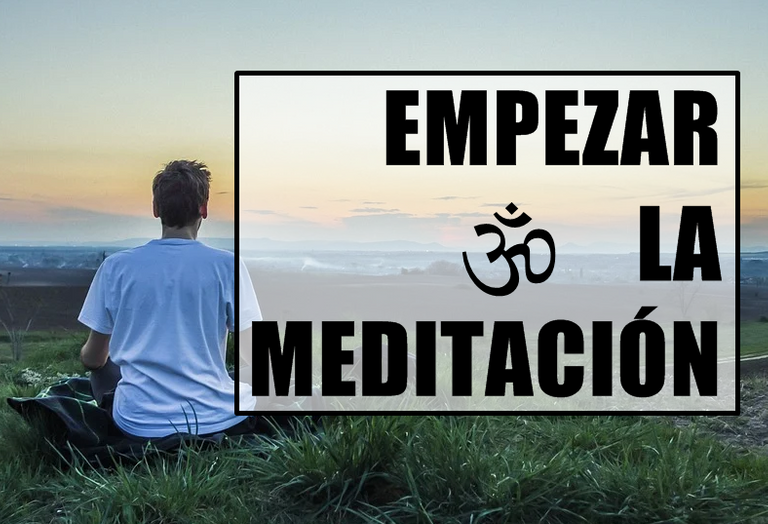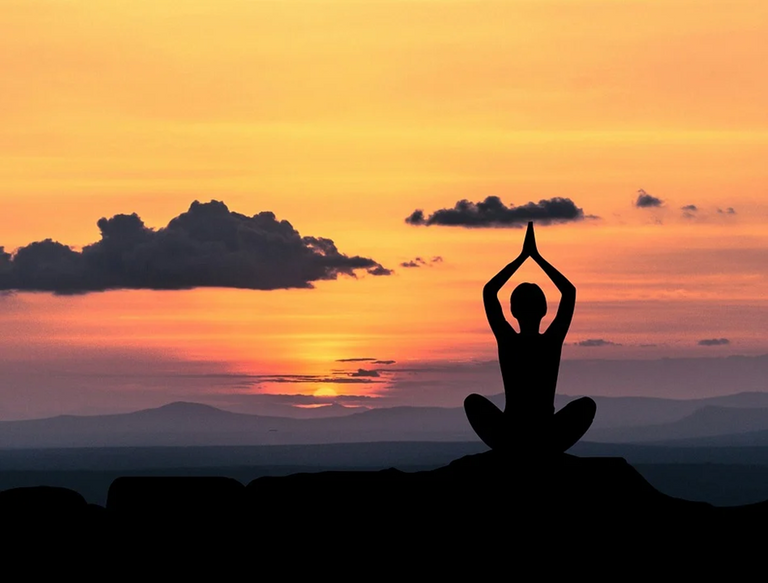Meditation used to be something very few people practiced, but in the last decade it has gained unprecedented respect and popularity. Hundreds of studies show its benefits and it is being practiced in more and more companies, schools and hospitals. Its rapid spread is also due to its accessibility: anyone can learn to meditate. All it takes is to understand three keys.
Spanish:
La meditación solía ser algo que muy pocas personas practicaban, pero en la última década ha ganado un respeto y una popularidad sin precedentes. Cientos de estudios muestran sus beneficios y se está practicando en más y más empresas, escuelas y hospitales. Su rápida difusión también se debe a su accesibilidad: cualquiera puede aprender a meditar. Todo lo que se necesita es entender tres claves.



What is meditation?
Our mind is as universal as it is wild. We all have one, but we rarely choose what we think, how we feel or what we attend to. It is controlled by a lot of bad habits, and too often its whimsical nonsense dictates how we live. Or, at least, that's what happens until we start meditating.
Meditation is a training, but a mental one. And it is far from "In blank". On the contrary, when we meditate we do something much more practical: we develop qualities such as attention, compassion and optimism; and we manage difficulties such as stress, anxiety and obsessive thoughts. If we train often enough, these skills cease to be passing mental events and become new habits. It's like weight training, except that the muscle is the brain and the dumbbell is the technique we practice.
Meditation serves to develop compassion and optimism; and to manage difficulties such as stress, anxiety and obsessive thoughts. Although the range of techniques on offer is very varied (and we will discuss this in the next section), studies agree that all meditations, when practiced regularly, bring a number of general benefits at the personal, social and neurological levels.

¿Qué es la meditación?
Nuestra mente es tan universal como salvaje. Todos tenemos una, pero rara vez elegimos lo que pensamos, cómo nos sentimos o qué atendemos. Está controlada por un montón de malos hábitos, y demasiado a menudo sus caprichosas tonterías dictan cómo vivimos. O, al menos, eso es lo que sucede hasta que empezamos a meditar.
La meditación es un entrenamiento, pero uno mental. Y está lejos de estar "en blanco". Al contrario, cuando meditamos hacemos algo mucho más práctico: desarrollamos cualidades como la atención, la compasión y el optimismo; y manejamos dificultades como el estrés, la ansiedad y los pensamientos obsesivos. Si nos entrenamos con la suficiente frecuencia, estas habilidades dejan de ser eventos mentales pasajeros y se convierten en nuevos hábitos. Es como el entrenamiento con pesas, excepto que el músculo es el cerebro y la mancuerna es la técnica que practicamos.
La meditación sirve para desarrollar la compasión y el optimismo; y para manejar dificultades como el estrés, la ansiedad y los pensamientos obsesivos. Aunque la gama de técnicas que se ofrecen es muy variada (y lo discutiremos en la siguiente sección), los estudios coinciden en que todas las meditaciones, cuando se practican con regularidad, aportan una serie de beneficios generales a nivel personal, social y neurológico.



The number of published studies on meditation is such that today we can have an overview of its effects. This is made possible by meta-analyses, a type of study that analyses the results of many investigations and draws general conclusions from them. The two most influential meta-analyses on meditation in healthy adults (i.e. without psychological disorders) were published in 2012 and 2017. The authors, from Chemnitz University of Technology, analysed data from 190 studies published between 1970 and 2015.
The results showed that people who meditate experience: less stress, better self-esteem, greater creativity, more emotional stability and more attention to the present. And the more satisfied one feels, the more one wants others to do so. This is suggested by the Harvard University team who conducted a meta-analysis with 26 studies on the relationship between meditation and altruism. The results, published in 2017, indicated that meditators tend to: be more empathetic, help others more, be more generous and feel more connected to others.
A meta-analysis published in 2016 and confirmed by expert professors from the University of British Columbia, could see that after analysing approximately 78 studies, they found that participants in meditation develop the brain in areas that relate to empathy, memory, attention and regulation of emotions.
In addition, people in psychological treatment also benefit from meditation. A meta-analysis of 209 studies conducted among the universities of Montreal, Laval and Boston and published in 2013 found that, when meditation is integrated into psychotherapy, it is especially effective in reducing stress, anxiety and depression. Whoever we are, meditation has much to offer. And today, learning to practice it is easier than ever.
El número de estudios publicados sobre la meditación es tal que hoy en día podemos tener una visión general de sus efectos. Esto es posible gracias a los meta-análisis, un tipo de estudio que analiza los resultados de muchas investigaciones y saca conclusiones generales de ellas. Los dos meta-análisis más influyentes sobre la meditación en adultos sanos (es decir, sin trastornos psicológicos) se publicaron en 2012 y 2017. Los autores, de la Universidad Tecnológica de Chemnitz, analizaron los datos de 190 estudios publicados entre 1970 y 2015.
Los resultados mostraron que las personas que meditan experimentan: menos estrés, mejor autoestima, mayor creatividad, más estabilidad emocional y más atención al presente. Y cuanto más satisfecho se siente uno, más quiere que los demás lo hagan. Esto es sugerido por el equipo de la Universidad de Harvard que realizó un meta-análisis con 26 estudios sobre la relación entre la meditación y el altruismo. Los resultados, publicados en 2017, indicaron que los meditadores tienden a: ser más empáticos, ayudar más a los demás, ser más generosos y sentirse más conectados con los demás.
Un meta-análisis publicado en 2016 y confirmado por profesores expertos de la Universidad de Columbia Británica, pudo comprobar que tras analizar aproximadamente 78 estudios, encontraron que los participantes en la meditación desarrollan el cerebro en áreas que se relacionan con la empatía, la memoria, la atención y la regulación de las emociones.
Además, las personas en tratamiento psicológico también se benefician de la meditación. Un metaanálisis de 209 estudios realizados entre las universidades de Montreal, Laval y Boston y publicados en 2013 encontró que, cuando la meditación se integra en la psicoterapia, es especialmente eficaz para reducir el estrés, la ansiedad y la depresión. Quienquiera que seamos, la meditación tiene mucho que ofrecer. Y hoy en día, aprender a practicarla es más fácil que nunca.



How to learn in seven steps.
- Choose the technique.
"Meditation" is a term that covers hundreds of techniques. Some are thousands of years old and their effectiveness is validated by tradition and science, while others are the invention of "new age" gurus eager to fatten up their bank accounts. So, how can we distinguish between the two?
By trial and error and common sense. We have to try different techniques until we find the one that best suits our needs. At the same time, we also have to investigate the origin of each and the credentials of their instructor. The key to success is consistency: meditating for 15 minutes a day is more effective than eating compulsively for three hours once a week.
- Find a place and time to practice.
The key to success in meditation is consistency: meditating for 15 minutes a day is more effective than bingeing for three hours once a week. That is why it is essential to make life easy for us and to create the best possible conditions for practice. There are two essential elements: a quiet place where we are not disturbed and a time of day when we can easily incorporate the meditation session.
The places you can choose from can be a warehouse, a corner of a room or even your car. The most recommended hours are before breakfast. As a beginner we should first develop the habit of daily meditation at any time; the early morning can be left for later.
- Adopt a comfortable position.
The basis of meditation is a comfortable and upright posture. Our goal is to immerse ourselves in the practice, so we need to be carefree with the body while it lasts. To do this, we don't need to cross our legs or make exotic hand gestures, but simply sit on a chair, a stool or a meditation cushion.
Then we rest our hands on our knees, stretch the back of our neck a little by pulling back our chin and close our eyes. Now we are ready for the adventure.
- Relax.
We cannot begin to meditate if we have a tense body, because instead of being focused we will be distracted by the discomfort of the body. So what you should do before meditating, is invest a few minutes to relax. Although you will automatically be meditating without realizing it. For this, we can try yoga, swimming, running or any other physical exercise, or we can simply spend a few minutes breathing deeply. Once we feel more comfortable, we can be ready to produce the audio of our guided meditation.
- Meditate.
From here we only have to follow the instructions in the audio, but there are some tips that will make the practice much more fluid: When the mind is distracted (which is normal and inevitable), we gently return it to the object of focus. In this way we simultaneously improve our attention and the way we treat ourselves during difficulties; if we feel overwhelmed or dizzy (which is unlikely, but possible), we should take a deep breath, open our eyes slowly and start moving slowly.
Our goal is not to have a bad time, but to train the mind; it is highly recommended to remain still while meditating. While it may be uncomfortable at first, it helps to focus in the long run; and we must set aside expectations about what is a "good" or "bad" meditation. Each session is unique, and the important thing is to do it daily and to the best of your ability.
- Integrating meditation into life.
To make progress in practice, it is important to integrate it into our daily lives. For example, if we are in the midst of developing a full attention to the present, one of the ways to integrate it is to try to maintain that state while doing some activity such as: play sport, walk our pet, talk to a friend, cook and eat, work on our homework and spend time with our partner. Thus the training and benefits extend from sitting meditation to permeability during the day.
- To deepen.
In time, not only will we feel the benefits of meditation, but questions will arise: How do we overcome the obstacles to practice, what should we do with the disconcerting experiences, is it good to change the meditation after practicing it for months, or how can we maintain the motivation to continue meditating daily?
Then it will be time to go deeper. Almost every city has yoga, Buddhist and meditation centres, but we must be careful not to commit ourselves to any of them. It is essential that we first make sure that the teacher in charge is reliable, because in this guild there are many sharks, intruders and smoke vendors. However, the real ones are true gems.
Cómo aprender en siete pasos.
- Elija la técnica.
"Meditación" es un término que abarca cientos de técnicas. Algunas tienen miles de años de antigüedad y su eficacia está validada por la tradición y la ciencia, mientras que otras son el invento de gurús de la "nueva era" deseosos de engordar sus cuentas bancarias. Entonces, ¿cómo podemos distinguir entre las dos?
Por ensayo y error y sentido común. Tenemos que probar diferentes técnicas hasta que encontremos la que mejor se adapte a nuestras necesidades. Al mismo tiempo, también tenemos que investigar el origen de cada una y las credenciales de su instructor. La clave del éxito es la consistencia: meditar durante 15 minutos al día es más efectivo que comer compulsivamente durante tres horas una vez a la semana.
- Encuentra un lugar y un tiempo para practicar.
La clave del éxito en la meditación es la consistencia: meditar durante 15 minutos al día es más efectivo que darse un atracón de tres horas una vez a la semana. Por eso es esencial hacernos la vida fácil y crear las mejores condiciones posibles para la práctica. Hay dos elementos esenciales: un lugar tranquilo donde no se nos moleste y un momento del día en el que podamos incorporar fácilmente la sesión de meditación.
Los lugares que puedes elegir pueden ser un almacén, un rincón de una habitación o incluso tu coche. Las horas más recomendadas son antes del desayuno. Como principiante debemos desarrollar primero el hábito de la meditación diaria a cualquier hora; la madrugada puede dejarse para más tarde.
- Adopte una posición cómoda.
La base de la meditación es una postura cómoda y recta. Nuestro objetivo es sumergirnos en la práctica, por lo que necesitamos estar despreocupados con el cuerpo mientras dure. Para ello, no necesitamos cruzar las piernas o hacer gestos exóticos con las manos, sino simplemente sentarnos en una silla, un taburete o un cojín de meditación.
Luego descansamos las manos sobre las rodillas, estiramos un poco la parte posterior de nuestro cuello tirando hacia atrás de la barbilla y cerramos los ojos. Ahora estamos listos para la aventura.
- Relájese.
No podemos empezar a meditar si tenemos el cuerpo tenso, porque en vez de estar concentrados nos distraerá la incomodidad del cuerpo. Así que lo que debes hacer antes de meditar, es invertir unos minutos para relajarte. Aunque automáticamente estarás meditando sin darte cuenta. Para ello, podemos probar el yoga, la natación, el correr o cualquier otro ejercicio físico, o simplemente podemos pasar unos minutos respirando profundamente. Una vez que nos sintamos más cómodos, podemos estar listos para producir el audio de nuestra meditación guiada.
- Meditar.
A partir de aquí sólo tenemos que seguir las instrucciones del audio, pero hay algunos consejos que harán la práctica mucho más fluida: Cuando la mente está distraída (lo cual es normal e inevitable), la devolvemos suavemente al objeto de enfoque. De esta manera mejoramos simultáneamente nuestra atención y la forma en que nos tratamos durante las dificultades; si nos sentimos abrumados o mareados (lo cual es poco probable, pero posible), debemos respirar profundamente, abrir los ojos lentamente y empezar a movernos con lentitud.
Nuestro objetivo no es pasarlo mal, sino entrenar la mente; es muy recomendable permanecer quieto mientras se medita. Aunque al principio puede resultar incómodo, a la larga ayuda a concentrarse; y debemos dejar de lado las expectativas sobre lo que es una meditación "buena" o "mala". Cada sesión es única, y lo importante es hacerla diariamente y lo mejor posible.
- Integrar la meditación en la vida.
Para progresar en la práctica, es importante integrarla en nuestra vida diaria. Por ejemplo, si estamos en medio del desarrollo de una atención completa al presente, una de las formas de integrarla es tratar de mantener ese estado mientras realizamos alguna actividad como: hacer deporte, pasear a nuestra mascota, hablar con un amigo, cocinar y comer, trabajar en nuestra tarea y pasar tiempo con nuestra pareja. Así, el entrenamiento y los beneficios se extienden desde la meditación sentada hasta la permeabilidad durante el día.
- Profundizar.
Con el tiempo, no sólo sentiremos los beneficios de la meditación, sino que surgirán preguntas: ¿Cómo superamos los obstáculos para la práctica, qué debemos hacer con las experiencias desconcertantes, es bueno cambiar la meditación después de practicarla durante meses, o cómo podemos mantener la motivación para seguir meditando diariamente?
Entonces será el momento de profundizar. Casi todas las ciudades tienen centros de yoga, budistas y de meditación, pero debemos tener cuidado de no comprometernos con ninguno de ellos. Es esencial que primero nos aseguremos de que el maestro a cargo sea confiable, porque en este gremio hay muchos tiburones, intrusos y vendedores de humo. Sin embargo, los verdaderos son verdaderas joyas.



Why should you start meditating?
Some criteria for examining a meditation master (or teacher) are: his qualifications and years of experience; the opinions and experiences of other students; the support of a genuine tradition; the controversies we find in Google or Wikipedia; and that their lifestyle matches what they teach. We can also participate in online courses from our home. A good place to start is Paramita, a non-profit platform offering free courses in meditation and Buddhist philosophy for all levels.
Because meditation is a safe investment in our health, well-being and personal development... but we will always find an excuse to start tomorrow. That's why the best thing is to be daring, surprise our old habits and dedicate 10 minutes today to start the practice. Our "I" of the future will thank us for it.
¿Por qué deberías empezar a meditar? Algunos criterios para examinar a un maestro de meditación (o profesor) son: sus calificaciones y años de experiencia; las opiniones y experiencias de otros estudiantes; el apoyo de una tradición genuina; las controversias que encontramos en Google o Wikipedia; y que su estilo de vida coincida con lo que enseñan. También podemos participar en cursos online desde nuestra casa. Un buen lugar para comenzar es Paramita, una plataforma sin fines de lucro que ofrece cursos gratuitos de meditación y filosofía budista para todos los niveles.
Porque la meditación es una inversión segura en nuestra salud, bienestar y desarrollo personal. Pero siempre encontraremos una excusa para empezar mañana. Por eso lo mejor es ser atrevidos, sorprender nuestros viejos hábitos y dedicar 10 minutos hoy para empezar la práctica. Nuestro "yo" del futuro nos lo agradecerá.



Win LOTUS Tokens and HIVE. In this month of December, there are also new challenges! The Natural Medicine community invites us to continue the custom. For more information HERE
Gana fichas de LOTUS y HIVE. En este mes de diciembre, también hay nuevos desafíos! La comunidad de Medicina Natural nos invita a continuar con la costumbre. Para más información AQUÍ.


Great insights friend, this is my favorite pastime, I take a hike into nature and have some caves where I sit and meditate near the sea shore in my area. When we still the mind, some profound insights emerge. Magic is happening.
I am very happy to know that. My meditations are in my room and from time to time I go for a walk. The key is to find the place and the moment, not to force things and the rest flows. Thanks for reading and commenting friend, it's a pleasure to see you here.
Good to hear your experience and insights on the path Pavan.
Lovely that you bring such clarity to the path incorporating meditation, an inspiring post that hopefully will bring others into the practice of meditation so they can reap the benefits!
I have benefited greatly from my years of meditation!
Knowing about meditation and its benefits is the first thing you need to know before you practice it. It has helped me a lot and I want everyone to know how important this is. Thanks for your comment. <3
Yes indeed @pavanjr, meditation is food for the Soul:) the images that me there.
That's right, meditation heals and uplifts. I like to know that more and more people are practicing it. Thank you for your comment.
Excelente publicación. Práctico yoga y desearía que observara mis publicaciones y me diera sus orientaciones y consejos en especial sobre meditación que es muy importante. Abrazos desde Cumaná y por unos meses en Puerto Ordaz. Éxitos. Siempre en contacto.
Hola Omar, que bueno saber que practicas la meditación, pero creeme que mientras tengas cambios positivos de la misma, no hace falta más nada. Tampoco soy un experto en esto, solo hablo desde mi experiencia personal y de investigaciones en internet. Saludos desde Cumaná. Gracias por leerme y comentar amigo.
Vives en Cumaná? Por casualidad nos conocemos. Soy profesor jubilado, trabajé en la Zona Educativa. Saludos. Éxitos. Estamos en contacto.
¡Excelente artículo!
Gracias por comentar. :)